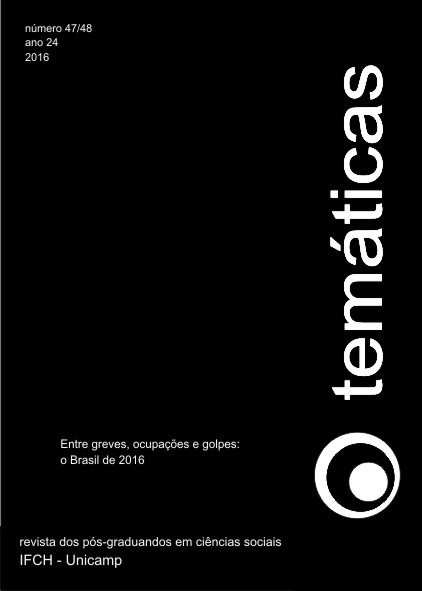Abstract
The recent impeachment process of President Dilma Rousseff and the taking presidential election of Michel Temer, in 2016, there was no consensus among Brazilians. Participating daily in the political debate marked by strong social stigmatizations, we sometimes treated and treated the other as a rival. In this polarized environment, the subjects' strategy was often to ridicule, exclude and / or deny the other. In this sense, this article is an effort to understand this period of political trampling that we are experiencing and feeling in everyday life when within the family we have to live with a “great opposite” in times of crisis; to reveal a latent conflict with those we love and that this crisis scenario has not spared. We started from experiences and daily reports to understand these political tensions with authoritarian tones that settled in the family environment when hostility and love, in short, were confused. We also highlight the gender asymmetries in the bosom and in the family conflict in which stereotypes emerge from the political conflict, to think how the denial of the other, while representing the saving of oneself, does not do so without causing suffering in the displacement and suspension of status on the family card.
References
ARENDT, Hannah. Origens do totalitarismo. São Paulo Companhia das Letras, 2013.
BUTLER, J. Corpos que pesam: sobre os limites discursivos do sexo. In: LOURO, G. L. (Org.). O corpo educado: pedagogias da sexualidade. Belo Horizonte: Autêntica, 2001, p. 151-172.
BUTLER, Judith. Quadros de guerra:quando a vida é passível de luto. Rio de Janeiro: Civilização Brasileira, 2015.
FOUCAULT, Michel. História da Sexualidade I: a vontade de saber. 13ª ed., Rio de Janeiro: Edições Graal, 1993.
FOUCAULT, Michel. Microfísica do poder. Rio de Janeiro: Graal, 1979.
GABACCIA, Donna. Seeking Common Ground: multidisciplinary studies of immigrant women in the United States. Westport, Connecticut/London: Praeger. 1992.
GOFFMAN, Erving. ESTIGMA:notas sobre a manipulação da identidade deteriorada. Trad. Mathias Lanbert. Versão digitalizada: 2004.
HIRATA, Helena; KERGOAT, Danièle. Novas configurações da divisão sexual do trabalho. Cadernos de Pesquisa, v. 37, n. 132, p. 595-609, 2007.
MOROKVASIC, M.; EREL, U.; SHINOZAKI, K. (Ed.) Crossing Borders and shifting boundaries. Vol I, Gender on the move. Opladen: Springer, 2003.
PEDRO, Joana Maria. Traduzindo o debate:o uso da categoria gênero na pesquisa histórica. História, v. 24, n. 1, p. 77-98, 2005.
SCOTT, Joan W. Gênero: Uma Categoria Útil para a Análise Histórica. São Paulo: Columbia University Press, n 4, 1989.
SOUZA, Érica R. de. Construindo “masculinidades femininas”: educação, corpo e violência na pré-adolescência. In: ALMEIDA, H.B., Costa, R. G., Ramirez, M.C. e Souza, E. (Org.) Gênero em Matizes. Bragança Paulista: EDUSF, 2002.
THORNE, Barrie. Feminist rethinking of the family: An overview. In: THORNE, Barrie; YALOM, Marilyn. Rethinking the family: Some feminist questions. New York: Longman, 1982, p. 1-24.
VALE DE ALMEIDA, Miguel. Senhores de Si.Uma Interpretação Antropológica da Masculinidade. Lisboa: Fim de Século. 1995.

This work is licensed under a Creative Commons Attribution-NonCommercial-ShareAlike 4.0 International License.
Copyright (c) 2016 Juliana Spagnol Sechinato, Rodrigo Fessel Sega

